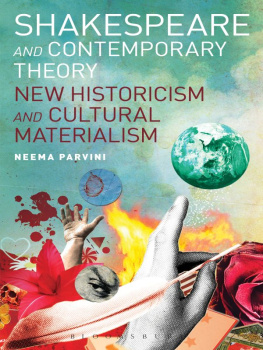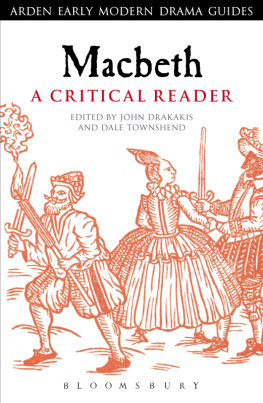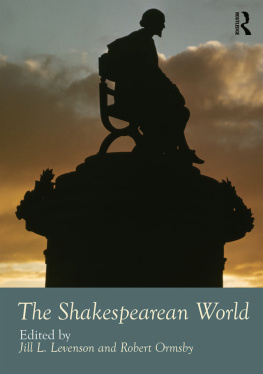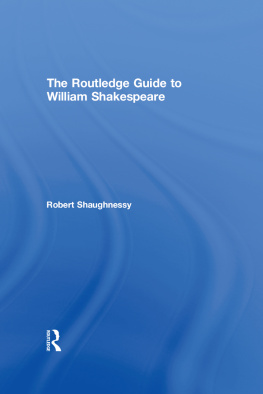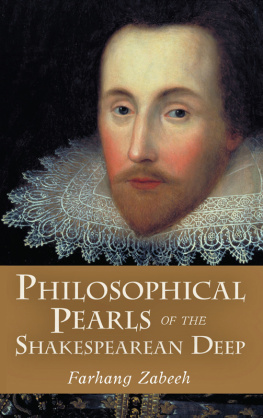Shakespeare William - Characters of Shakespears Plays
Here you can read online Shakespeare William - Characters of Shakespears Plays full text of the book (entire story) in english for free. Download pdf and epub, get meaning, cover and reviews about this ebook. City: New York;NY, year: 2011, publisher: Barnes & Noble Digital Library, genre: Science. Description of the work, (preface) as well as reviews are available. Best literature library LitArk.com created for fans of good reading and offers a wide selection of genres:
Romance novel
Science fiction
Adventure
Detective
Science
History
Home and family
Prose
Art
Politics
Computer
Non-fiction
Religion
Business
Children
Humor
Choose a favorite category and find really read worthwhile books. Enjoy immersion in the world of imagination, feel the emotions of the characters or learn something new for yourself, make an fascinating discovery.
- Book:Characters of Shakespears Plays
- Author:
- Publisher:Barnes & Noble Digital Library
- Genre:
- Year:2011
- City:New York;NY
- Rating:4 / 5
- Favourites:Add to favourites
- Your mark:
- 80
- 1
- 2
- 3
- 4
- 5
Characters of Shakespears Plays: summary, description and annotation
We offer to read an annotation, description, summary or preface (depends on what the author of the book "Characters of Shakespears Plays" wrote himself). If you haven't found the necessary information about the book — write in the comments, we will try to find it.
Shakespeare William: author's other books
Who wrote Characters of Shakespears Plays? Find out the surname, the name of the author of the book and a list of all author's works by series.
Characters of Shakespears Plays — read online for free the complete book (whole text) full work
Below is the text of the book, divided by pages. System saving the place of the last page read, allows you to conveniently read the book "Characters of Shakespears Plays" online for free, without having to search again every time where you left off. Put a bookmark, and you can go to the page where you finished reading at any time.
Font size:
Interval:
Bookmark:
WILLIAM HAZLITT

This 2011 edition published by Barnes & Noble, Inc.
All rights reserved. No part of this publication may be reproduced, stored in a retrieval system, or transmitted, in any form or by any means, electronic, mechanical, photocopying, recording, or otherwise, without prior written permission from the publisher.
Barnes & Noble, Inc.
122 Fifth Avenue
New York, NY 10011
ISBN: 978-1-4114-5160-5
PREFACE
I T is observed by Mr. Pope, that "If ever any author deserved the name of an original, it was Shakespear. Homer himself drew not his art so immediately from the fountains of nature: it proceeded through gyptian strainers and channels, and came to him not without some tincture of the learning, or some cast of the models, of those before him. The poetry of Shakespear was inspiration: indeed, he is not so much an imitator as an instrument of nature; and it is not so just to say that he speaks from her, as that she speaks through him.
"His characters are so much nature herself, that it is a sort of injury to call them by so distant a name as copies of her. Those of other poets have a constant resemblance, which shows that they received them from one another, and were but multipliers of the same image: each picture, like a mock-rainbow, is but the reflection of a reflection. But every single character in Shakespear is as much an individual as those in life itself; it is as impossible to find any two alike; and such as from their relation or affinity in any respect appear most to be twins, will upon comparison be found remarkably distinct. To this life and variety of character, we must add the wonderful preservation of it; which is such throughout his plays, that had all the speeches been printed without the very names of the persons, I believe one might have applied them with certainty to every speaker."
The object of the volume here offered to the public, is to illustrate these remarks in a more particular manner by a reference to each play. A gentleman of the name of Mason, We will at the same time confess that some little jealousy of the character of the national understanding was not without its share in producing the following undertaking, for "we were piqued" that it should be reserved for a foreign critic to give "reasons for the faith which we English have in Shakespear." Certainly no writer among ourselves has shown either the same enthusiastic admiration of his genius, or the same philosophical acuteness in pointing out his characteristic excellences. As we have pretty well exhausted all we had to say upon this subject in the body of the work, we shall here transcribe Schlegel's general account of Shakespear, which is in the following words:
"Never, perhaps, was there so comprehensive a talent for the delineation of character as Shakespear's. It not only grasps the diversities of rank, sex, and age, down to the dawnings of infancy; not only do the king and the beggar, the hero and the pickpocket, the sage and the idiot speak and act with equal truth; not only does he transport himself to distant ages and foreign nations, and portray in the most accurate manner, with only a few apparent violations of costume, the spirit of the ancient Romans, of the French in their wars with the English, of the English themselves during a great part of their history, of the Southern Europeans (in the serious part of many comedies), the cultivated society of that time, and the former rude and barbarous state of the North; his human characters have not only such depth and precision that they cannot be arranged under classes, and are inexhaustible, even in conception: no, this Prometheus not merely forms men, he opens the gates of the magical world of spirits; calls up the midnight ghost; exhibits before us his witches amidst their unhallowed mysteries; peoples the air with sportive fairies and sylphs: and these beings, existing only in imagination, possess such truth and consistency, that even when deformed monsters like Caliban, he extorts the conviction that if there should be such beings they would so conduct themselves. In a word, as he carries with him the most fruitful and daring fancy into the kingdom of nature; on the other hand, he carries nature into the regions of fancy, lying beyond the confines of reality. We are lost in astonishment at seeing the extraordinary, the wonderful, and the unheard of, in such intimate nearness.
"If Shakespear deserves our admiration for his characters, he is equally deserving of it for his exhibition of passion, taking this word in its widest signification, as including every mental condition, every tone from indifference or familiar mirth to the wildest rage and despair. He gives us the history of minds; he lays open to us, in a single word, a whole series of preceding conditions. His passions do not at first stand displayed to us in all their height, as is the case with so many tragic poets who, in the language of Lessing, are thorough masters of the legal style of love. He paints, in a most inimitable manner, the gradual progress from the first origin. 'He gives,' as Lessing says, 'a living picture of all the most minute and secret artifices by which a feeling steals into our souls; of all the imperceptible advantages which it there gains, of all the stratagems by which every other passion is made subservient to it, till it becomes the sole tyrant of our desires and our aversions.' Of all poets, perhaps, he alone has portrayed the mental diseasesmelancholy, delirium, lunacywith such inexpressible, and in every respect definite truth, that the physician may enrich his observations from them in the same manner as from real cases.
"And yet Johnson has objected to Shakespear, that his pathos is not always natural and free from affectation. There are, it is true, passages, though comparatively speaking very few, where his poetry exceeds the bounds of true dialogue, where a too soaring imagination, a too luxuriant wit, rendered the complete dramatic forgetfulness of himself impossible. With this exception, the censure originates only in a fanciless way of thinking, to which everything appears unnatural that does not suit its own tame insipidity. Hence, an idea has been formed of simple and natural pathos, which consists in exclamations destitute of imagery, and nowise elevated above every-day life. But energetical passions electrify the whole of the mental powers, and will, consequently, in highly favoured natures, express themselves in an ingenious and figurative manner. It has been often remarked that indignation gives wit; and, as despair occasionally breaks out into laughter, it may sometimes also give vent to itself in antithetical comparisons.
"Besides, the rights of the poetical form have not been duly weighed. Shakespear, who was always sure of his object, to move in a sufficiently powerful manner when he wished to do so, has occasionally, by indulging in a freer play, purposely moderated the impressions when too painful, and immediately introduced a musical alleviation of our sympathy. He had not those rude ideas of his art which many moderns seem to have, as if the poet, like the clown in the proverb, must strike twice on the same place. An ancient rhetorician delivered a caution against dwelling too long on the excitation of pity; for nothing, he said, dries so soon as tears; and Shakespear acted conformably to this ingenious maxim without knowing it.
"The objection, that Shakespear wounds our feelings by the open display of the most disgusting moral odiousness, harrows up the mind unmercifully, and tortures even our senses by the exhibition of the most insupportable and hateful spectacles, is one of much greater importance. He has never, in fact, varnished over wild and bloodthirsty passions with a pleasing exterior: never clothed crime and want of principle with a false show of greatness of soul, and in that respect he is every way deserving of praise. Twice he has portrayed downright villains; and the masterly way in which he has contrived to elude impressions of too painful a nature may be seen in Iago and Richard III. The constant reference to a petty and puny race must cripple the boldness of the poet. Fortunately for his art, Shakespear lived in an age extremely susceptible of noble and tender impressions, but which had still enough of the firmness inherited from a vigorous olden time not to shrink back with dismay from every strong and violent picture. We have lived to see tragedies of which the catastrophe consists in the swoon of an enamoured princess. If Shakespear falls occasionally into the opposite extreme, it is a noble error, originating in the fulness of a gigantic strength: and yet this tragical Titan, who storms the heavens, and threatens to tear the world from off its hinges; who, more terrible than schylus, makes our hair stand on end, and congeals our blood with horror, possessed, at the same time, the insinuating loveliness of the sweetest poetry. He plays with love like a child, and his songs are breathed out like melting sighs. He unites in his genius the utmost elevation and the utmost depth; and the most foreign, and even apparently irreconcileable properties subsist in him peaceably together. The world of spirits and nature have laid all their treasures at his feet. In strength a demigod, in profundity of view a prophet, in all-seeing wisdom a protecting spirit of a higher order, he lowers himself to mortals, as if unconscious of his superiority: and is as open and unassuming as a child.
Font size:
Interval:
Bookmark:
Similar books «Characters of Shakespears Plays»
Look at similar books to Characters of Shakespears Plays. We have selected literature similar in name and meaning in the hope of providing readers with more options to find new, interesting, not yet read works.
Discussion, reviews of the book Characters of Shakespears Plays and just readers' own opinions. Leave your comments, write what you think about the work, its meaning or the main characters. Specify what exactly you liked and what you didn't like, and why you think so.



